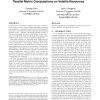Free Online Productivity Tools
i2Speak
i2Symbol
i2OCR
iTex2Img
iWeb2Print
iWeb2Shot
i2Type
iPdf2Split
iPdf2Merge
i2Bopomofo
i2Arabic
i2Style
i2Image
i2PDF
iLatex2Rtf
Sci2ools
112
click to vote
IPPS
2006
IEEE
2006
IEEE
Algorithm-based checkpoint-free fault tolerance for parallel matrix computations on volatile resources
As the desire of scientists to perform ever larger computations drives the size of today’s high performance computers from hundreds, to thousands, and even tens of thousands of processors, node failures in these computers are becoming frequent events. Although checkpoint/rollback-recovery is the typical technique to tolerate such failures, it often introduces a considerable overhead, especially when applications modify a large mount of memory between checkpoints. This paper presents an algorithm-based checkpoint-free fault tolerance approach in which, instead of taking checkpoints periodically, a coded global consistent state of the critical application data is maintained in memory by modifying applications to operate on encoded data. Although the applicability of this approach is not so general as the typical checkpoint/rollback-recovery approach, in parallel linear algebra computations where it usually works, because no periodical checkpoint or rollback-recovery is involved in thi...
Distributed And Parallel Computing | IPPS 2006 | Node Failures | Partial Node Failures | Typical Checkpoint/rollback-recovery Approach |
| Added | 12 Jun 2010 |
| Updated | 12 Jun 2010 |
| Type | Conference |
| Year | 2006 |
| Where | IPPS |
| Authors | Zizhong Chen, Jack Dongarra |
Comments (0)

